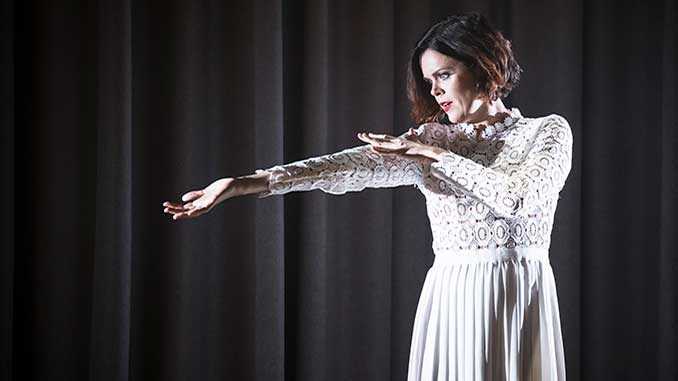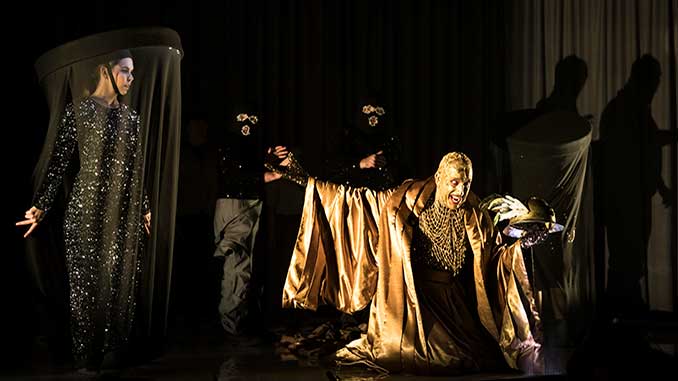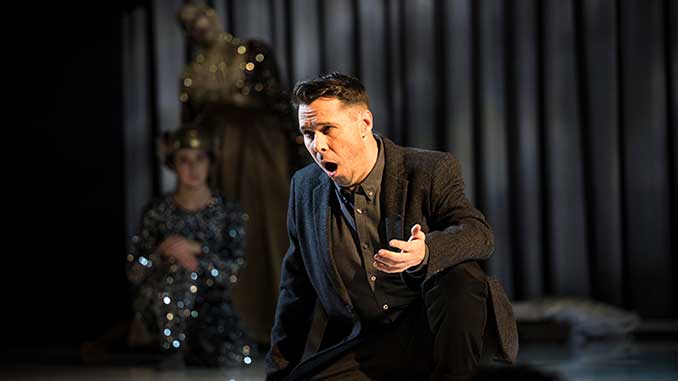 In less than 75 minutes, English Baroque composer Henry Purcell’s compact prologue and three-act Dido and Aeneas is over, but its affecting and transcendent music ripples long after. On the stage, it comes to life with creative nous and clarity in Pinchgut Opera’s new production directed by Lucy Clements in her company debut.
In less than 75 minutes, English Baroque composer Henry Purcell’s compact prologue and three-act Dido and Aeneas is over, but its affecting and transcendent music ripples long after. On the stage, it comes to life with creative nous and clarity in Pinchgut Opera’s new production directed by Lucy Clements in her company debut.
Dido and Aeneas recalls the story of the founder and Queen of Carthage, Dido, and her love for the Trojan prince, Aeneas, who is shipwrecked after fleeing a besieged Troy. The Sorceress and her witches, however, deceive Aeneas into leaving Carthage for Italy at the request of the gods. Then, overcome with a sense of betrayal and grief, Dido chooses death.
Stripped of time and place and stylised to magnify the heart of Purcell’s work with truthfulness, Clements sheaths the work with sensitivity and poetry.
With no known score in Purcell’s hand in existence and Nahum Tate’s libretto being the only 17th century source, it also provides a canvas for musical scholars to rework. The prologue is certainly lost, as are several dances but, with Artistic Director Erin Helyard’s scholastic and theatrical insight, a little newness comes to the work.
Most evident is playwright and actor Kate Mulvany’s inspired spoken-word prologue which cleverly provides a tumultuous backstory delivered by the cunning Sorceress. For that, Mulvany has the inimitable tenor Kanen Breen at her disposal to deliver one of the most riveting dramatic performances you’re likely to see on any stage. Thereon, Breen remains on stage almost entirely throughout, spying on and giving a constant reminder of who is in control.
 Dido and Aeneas might very well capture the intrinsic nature of tragic love but Breen’s star turn, including brilliantly crafted, acrobatic singing, brings centrality and tension to the work and emphasises interventions that combat love and upset the equilibrium to reveal its fragility.
Dido and Aeneas might very well capture the intrinsic nature of tragic love but Breen’s star turn, including brilliantly crafted, acrobatic singing, brings centrality and tension to the work and emphasises interventions that combat love and upset the equilibrium to reveal its fragility.
In a long monologue that includes references to Dido as a hateful “vagrant refugee” – certainly testing racist waters – Breen drips, gnarls and enflames the words with a physical performance to match. It has astonishing impact, as does designer Jeremy Allen’s flowing and shimmering dark gold haute-couture gown, matching makeup and sparkly gold gloves.
That impact is all the more outlined in Allen’s otherwise modest scheme. There is no built set. The stage is simply bordered on three sides by long grey curtains with a cutout on either side for entrances and exits.
A mix of costumes easily define the characters. Dido changes from one potent elegant dress in white as a signifier of purity to the second in blood red before death. There is a soft-palette of unfussy rustic-looking outfits for Dido’s people and the broad, circular rimmed black hats, with their floor-length hanging tulle for two of the sorceress’ witches, evoke the spirit of the underworld. The picture is completed with Morgan Moroney’s judicial, multi-mood lighting design.
As Dido, soprano Valda Wilson presents a striking statuesque quality that tellingly begins to melt when she falls in love with Aeneas, velvety of voice and imparting subtle nuance of expression.
 Baritone David Greco instils Aeneas with authoritative bearing and vocal muscularity. From accepting the plotted call to duty to his change of mind to remain with Dido, much is navigated in Aeneas’ relatively short appearance but Greco makes it a powerful and convincing spell.
Baritone David Greco instils Aeneas with authoritative bearing and vocal muscularity. From accepting the plotted call to duty to his change of mind to remain with Dido, much is navigated in Aeneas’ relatively short appearance but Greco makes it a powerful and convincing spell.
Portraying Dido’s loyal handmaiden, Belinda, with comforting honesty, Sara Macliver’s radiant and pristine soprano is a sound match. Most affectingly, Macliver and Wilson’s Belinda and Dido show an inseparable bond which resonates through to Dido’s death when Dido stabs herself and dies in Belinda’s arms, singing Dido’s Lament with her last breaths.
It’s the opera’s most interpreted moment – it also features in the final season of the HBO series The White Lotus. Wilson brings the anguish and pain of loss to a poignant and ethereal climax. And Clements’ final touch in having the Sorceress escort Dido from the stage is a compelling bookend to the Sorceress’ Prologue sentiments.
Purcell’s music soars to glistening melodic and harmonic beauty with some of the most memorable music for the ensemble of witches, spirits, and mortals – among whom a quartet of sailors sing a highlight with an entertaining roughened ditty. Louis Hurley, Andrew O’Connor, Freddy Shaw and Jack Jordan do the honours.
They are joined by Michelle Ryan, Stephanie Dillon, Lana Kains and Olivia Payne as part of the Cantillation singers. Paired as the First and Second Witches respectively, Ryan and Payne are a particularly impressive vocal delight.
Where the several dances are no longer, Helyard and guitarist Simon Martyn-Ellis have inserted music by Purcell and Francesco Corbetta, slotting in seamlessly and providing opportunity for the ensemble to parade movement director Shannon Burns’ steps.
Although unsophisticated and a tad mundane, they are accompanied by a soundscape of both sublime transparency and richness purring and revving below under Helyard’s tightly paced reading and methodical command.
Orchestra of the Antipodes, as they always can be relied on to do, excelled on Thursday’s opening night, shaping Purcell’s fine ornamentations and textures splendidly. And Martyn-Ellis shone for an intricately played guitar solo.
Just 75 minutes of your time with Pinchgut’s Dido and Aeneas isn’t a lot to ask for. The only trouble is that getting to experience it will be over within days.
Dido and Aeneas
City Recital Hall, 2 – 12 Angel Place, Sydney
Performance: Thursday 30 May 2024
Season continues to 3 June 2024
Information and Bookings: www.pinchgutopera.com.au
Images: Valda Wilson in Pinchgut Opera’s Dido and Aeneas – photo by Cassandra Hannagan | Olivia Payne, Louis Hurley, Andrew O’Connor and Kanen Breen in Pinchgut Opera’s Dido and Aeneas – photo by Cassandra Hannagan | David Greco in Pinchgut Opera’s Dido and Aeneas – photo by Cassandra Hannagan
Review: Paul Selar
